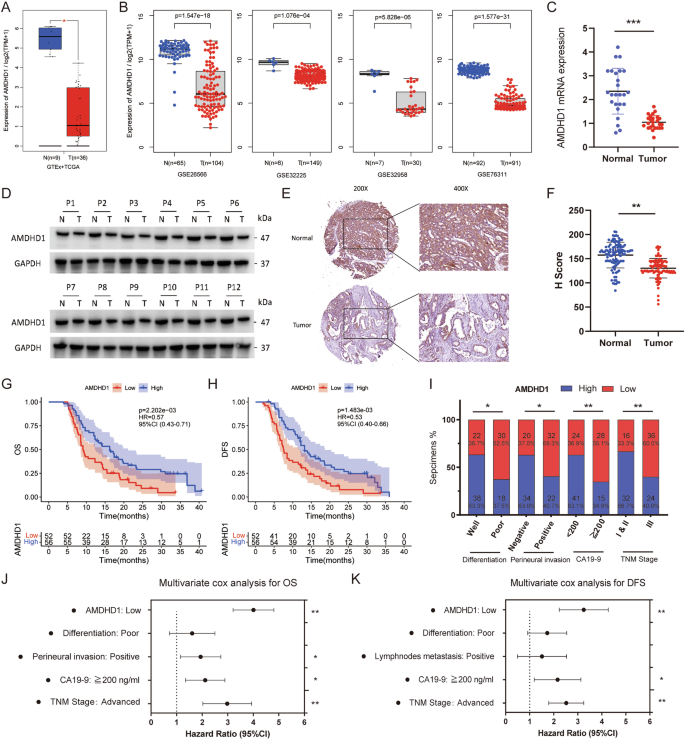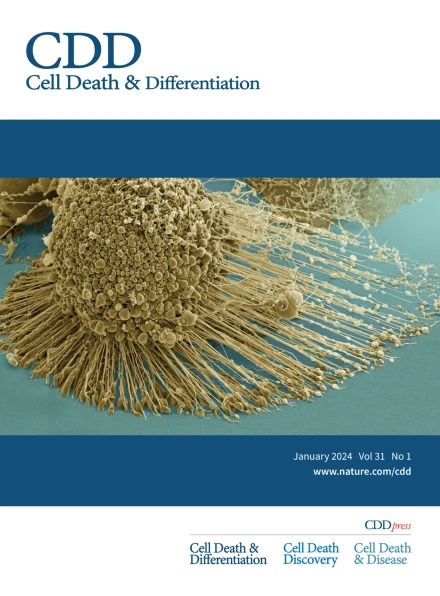AMDHD1 是一种肿瘤抑制因子,有助于激活胆管癌中的 TGF-β 信号通路。
IF 13.7
1区 生物学
Q1 BIOCHEMISTRY & MOLECULAR BIOLOGY
引用次数: 0
摘要
胆管癌(CCA)是消化系统的一种恶性肿瘤,其特点是具有侵袭性和缺乏有效的治疗生物标志物。尽管最近的研究表明 AMDHD1 与肿瘤的形成有关,但其在 CCA 发展过程中的作用尚未得到充分探讨。我们利用多个生物信息数据集和 108 个临床样本研究了 AMDHD1 在 CCA 中的表达。然后,我们进行了体外和体内实验,评估其对肿瘤生长和转移的影响。此外,我们还采用了蛋白质组分析和免疫沉淀质谱法来确定AMDHD1的下游效应因子。我们发现 AMDHD1 在 CCA 中被下调,而这种下调与不良的临床病理特征和预后有关。我们还证实,AMDHD1的过表达会阻碍细胞周期的G1/S进展,促进细胞凋亡,从而抑制肿瘤的生长和转移。从机理上讲,我们发现AMDHD1以依赖于TGF-β的方式运行,而抑制TGF-β信号传导可减弱AMDHD1过表达对CCA细胞的影响。具体而言,AMDHD1通过与MH2结构域结合抑制SMAD4蛋白的泛素化和降解,并协同增强SMAD2/3磷酸化,从而激活TGF-β信号通路,抑制CCA细胞的增殖和迁移。我们的研究发现,AMDHD1是CCA的重要预后生物标志物和肿瘤抑制因子。它强调了AMDHD1/TGF-β信号通路在CCA的发生和发展中的关键作用。本文章由计算机程序翻译,如有差异,请以英文原文为准。


AMDHD1 acts as a tumor suppressor and contributes to activation of TGF-β signaling pathway in cholangiocarcinoma
Cholangiocarcinoma (CCA) is a malignant tumor of the digestive system, characterized by its aggressive behavior and the absence of effective therapeutic biomarkers. Although recent studies have implicated AMDHD1 in tumor formation, its role in CCA development has been insufficiently explored. We utilized multiple bioinformatic datasets alongside 108 clinical samples to examine AMDHD1 expression in CCA. Then, in vitro and in vivo experiments were conducted to assess its impact on tumor growth and metastasis. Furthermore, proteomic analysis and immunoprecipitation mass spectrometry were employed to identify the downstream effectors of AMDHD1. We discovered that AMDHD1 was down-regulated in CCA and this down-regulation was associated with adverse clinicopathological features and prognosis. We also demonstrated that overexpression of AMDHD1 hindered G1/S progression in the cell cycle and promoted apoptosis, thereby inhibiting tumor growth and metastasis. Mechanistically, we found that AMDHD1 operated in a TGF-β-dependent manner and the inhibition of TGF-β signaling abrogated the effect of AMDHD1 overexpression on CCA cells. Specifically, AMDHD1 inhibited the ubiquitination and degradation of the SMAD4 protein through binding to the MH2 domain and synergistically enhanced SMAD2/3 phosphorylation, which activated of TGF-β signaling pathway and resulted in the suppression of CCA cell proliferation and migration. Our study identifies AMDHD1 as a significant prognostic biomarker and a tumor suppressor in CCA. It underscores the pivotal role of the AMDHD1/TGF-β signaling pathway in the development and progression of CCA.
求助全文
通过发布文献求助,成功后即可免费获取论文全文。
去求助
来源期刊

Cell Death and Differentiation
生物-生化与分子生物学
CiteScore
24.70
自引率
1.60%
发文量
181
审稿时长
3 months
期刊介绍:
Mission, vision and values of Cell Death & Differentiation:
To devote itself to scientific excellence in the field of cell biology, molecular biology, and biochemistry of cell death and disease.
To provide a unified forum for scientists and clinical researchers
It is committed to the rapid publication of high quality original papers relating to these subjects, together with topical, usually solicited, reviews, meeting reports, editorial correspondence and occasional commentaries on controversial and scientifically informative issues.
 求助内容:
求助内容: 应助结果提醒方式:
应助结果提醒方式:


